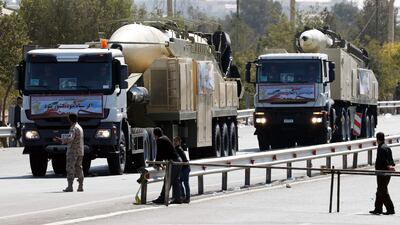The stance US president Donald Trump has adopted towards the nuclear deal with Iran leaves little room for speculation, and though his predecessor's foreign policy towards Iran was clearly shaped by the agreement, it is a legacy Mr Trump finds wanting. Before the end of the week, he will have to decide whether or not to decertify the 2015 nuclear deal forged by the P5+1 with Iran. It is one he describes as one of "the worst deals ever".
Over the past three months, several events have put it at risk. In an act of defiance, Tehran launched mid-range ballistic missiles targeting Deir Ezzor in Syria in June, and though its intention was to target ISIL, it was symbolically sending a message to the US. Its launch closely followed a bill's passage through the US senate to impose sanctions on individuals involved with Iran’s ballistic missile programme.
On the sidelines of the 72nd UN General Assembly in New York last month, Hassan Rouhani, Iran's president, warned the US that abandoning the agreement would backfire. Several signatories of the deal have clearly voiced their support and stepped up efforts to ensure the landmark deal is maintained. Britain's Theresa May and Boris Johnson have actively intervened with Washington and Tehran to stress its importance when it comes to regional stability and security, reiterating the necessity for all parties to maintain their commitments.
But that is not all. Iran has long stirred trouble in the region, directly or indirectly impacting the stability and security of its neighbours in the Middle East and in the GCC.
Should Mr Trump refrain from certifying Iran's compliance with the nuclear accord by October 15, he could provoke a serious international crisis. But should he go ahead and accredit it, he would be acknowledging that the deal as it stands allows Iran to hold too many cards.
_______________
Read more from Opinion
Editorial: The ambition for a nuclear-free Earth must not blind us to reality
Editorial: US-Iran meeting at UN General Assembly will be one to watch
The US must find a third war over Iran, one that is neither reticent nor reckless
Tillerson, Trump and the collapse of America's standing and credibility
_______________
Follow The National's Opinion section on Twitter

